Equation of a Straight Line
The equation of a straight line is usually written this way:
y = mx + b
(or "y = mx + c" in the UK see below)
What does it stand for?
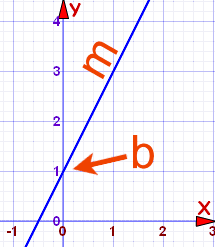
 | |
| Slope (or Gradient) | Y Intercept |
y = how far up
x = how far along
m = Slope or Gradient (how steep the line is)
b = the Y Intercept (where the line crosses the Y axis)
How do you find "m" and "b"?
- b is easy: just see where the line crosses the Y axis.
- m (the Slope) needs some calculation:
| m = Change in YChange in X | 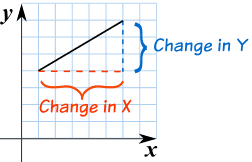 |
Knowing this we can work out the equation of a straight line:
Example 1
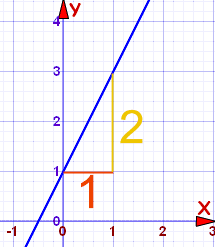
m = 21 = 2
b = 1 (where the line crosses the Y-Axis)
| So: y = 2x + 1 |
With that equation you can now ...
... choose any value for x and find the matching value for y
For example, when x is 1:
y = 2×1 + 1 = 3
Check for yourself that x=1 and y=3 is actually on the line.
Or we could choose another value for x, such as 7:
y = 2×7 + 1 = 15
And so when x=7 you will have y=15
Example 2
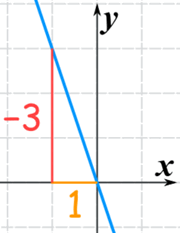
m = −31 = −3
b = 0
This gives us y = −3x + 0
We do not need the zero!
This gives us y = −3x + 0
We do not need the zero!
| So: y = −3x |
Example 3: Vertical Line
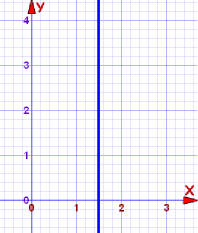
What is the equation for a vertical line?
The slope is undefined ... and where does it cross the Y-Axis?
The slope is undefined ... and where does it cross the Y-Axis?
In fact, this is a special case, and you use a different equation, not "y=...", but instead you use "x=...".
Like this:
x = 1.5
|
Every point on the line has x coordinate 1.5,
that is why its equation is x = 1.5
that is why its equation is x = 1.5
Rise and Run
Sometimes the words "rise" and "run" are used.
And so the slope "m" is:
m = riserun
You might find that easier to remember
|  |
 | Now Play With The Graph !
You can see the effect of different values of m (the slope) and b(the y intercept) at Explore the Straight Line Graph
|
Other Forms
We have been looking at the "slope-intercept" form. The equation of a straight line can be written in many other ways.
Another popular form is the Point-Slope Equation of a Straight Line.
Footnote
Country Note:
Different Countries teach different "notation" (as sent to me by kind readers):
| In the US, Australia, Canada, Eritrea, Iran, Mexico, Portugal, Philippines and Saudi Arabia the notation is: | y = mx + b |
| In the UK, Australia (also), Bahamas, Bangladesh, Belgium, Brunei, Bulgaria, Cyprus, Egypt, Germany, Ghana, India, Indonesia, Ireland, Jamaica, Kenya, Kuwait, Malaysia, Malawi, Malta, Nepal, New Zealand, Nigeria, Oman, Pakistan, Peru, Poland, Singapore, Solomon Islands, South Africa, Sri Lanka, Turkey, UAE, Zambia and Zimbabwe | y = mx + c |
| In Afghanistan, Albania, Algeria, Brazil, China, Czech Republic, Denmark, Ethiopia, France, Lebanon, Netherlands, Kosovo, Kyrgyzstan, Norway, Romania, South Korea, Spain, Tunisia and Viet Nam: | y = ax + b |
| In Azerbaijan, China, Finland, Russia and Ukraine: | y = kx + b |
| In Greece: | ψ = αχ + β |
| In Italy: | y = mx + q |
| In Japan: | y = mx + d |
| In Cuba and Israel: | y = mx + n |
| In Romania: | y = gA + C |
| In Latvia and Sweden: | y = kx + m |
| In Serbia and Slovenia: | y = kx + n |
| In your country: | let us know! |
... but it all means the same thing, just different letters.
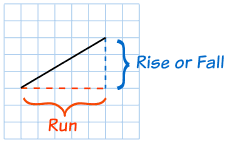
![math [image]](http://www.mathopolis.com/questions/latex/1/3/8d734b17ac0fdaa25adf80ae239f341.gif)
![math [image]](http://www.mathopolis.com/questions/latex/4/b/2a66fbd4f7bfbd43c710ad42d735b21.gif)
Gradient (Slope) of a Straight Line
The Gradient (also called Slope) of a straight line shows how steep a straight line is.
Calculate
To calculate the Gradient:
Divide the change in height by the change in horizontal distance
| Gradient = Change in YChange in X |  |
Examples:
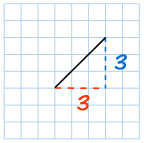 | The Gradient of this line = 33 = 1 So the Gradient is equal to 1 |
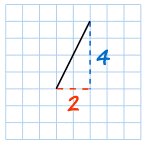 | The Gradient of this line = 42 = 2 | |
| The line is steeper, and so the Gradient is larger. | ||
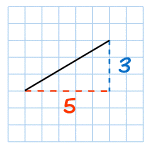 | The Gradient of this line = 35 = 0.6 | |
| The line is less steep, and so the Gradient is smaller. | ||
Positive or Negative?
Important:
- Starting from the left end of the line and going across to the right is positive
(but going across to the left is negative). - Up is positive, and down is negative
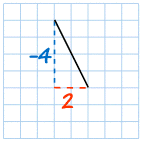 | Gradient = −42 = −2 |
That line goes down as you move along, so it has a negative Gradient.
Straight Across
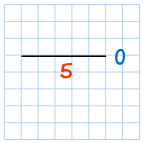 | Gradient = 05 = 0 |
A line that goes straight across (Horizontal) has a Gradient of zero.
Straight Up and Down
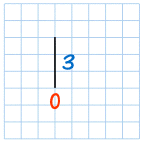 | Gradient = 30 = undefined |
That last one is a bit tricky ... you can't divide by zero,
so a "straight up and down" (vertical) line's Gradient is "undefined".
so a "straight up and down" (vertical) line's Gradient is "undefined".
Rise and Run
Sometimes the horizontal change is called "run", and the vertical change is called "rise" or "fall":

They are just different words, none of the calculations change.
What is the gradient (slope) of this line:
![[image]](http://www.mathopolis.com/questions/images/f/d/f6a74f47cafc15f47c71a180f5f42f2.gif)
![[image]](http://www.mathopolis.com/questions/images/f/d/f6a74f47cafc15f47c71a180f5f42f2.gif)
A
-2
B
![math [image]](http://www.mathopolis.com/questions/latex/1/3/8d734b17ac0fdaa25adf80ae239f341.gif)
C
![math [image]](http://www.mathopolis.com/questions/latex/4/b/2a66fbd4f7bfbd43c710ad42d735b21.gif)
D
2
What is the equation of the straight line shown in the diagram?
![[image]](http://www.mathopolis.com/questions/images/4/e/d34810573f43d311364ffcd57a77b22.jpg)
![[image]](http://www.mathopolis.com/questions/images/4/e/d34810573f43d311364ffcd57a77b22.jpg)
A
y = -3
B
x = -3
C
y = -3x + 3
D
y = -3x - 3
No comments:
Post a Comment